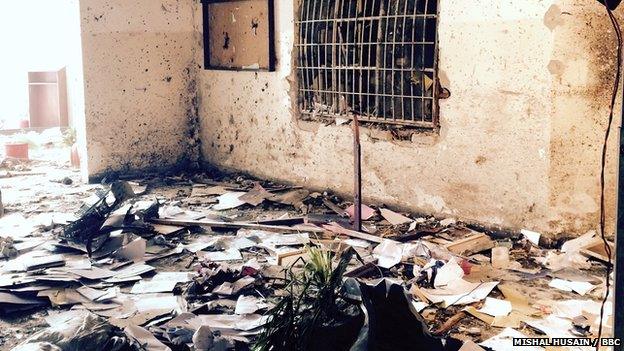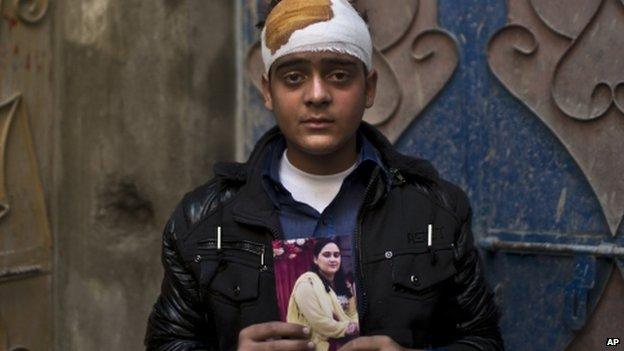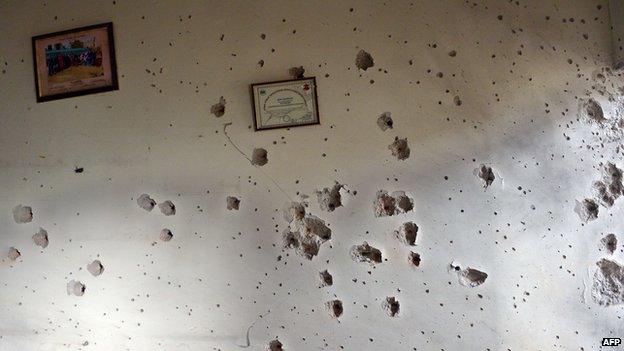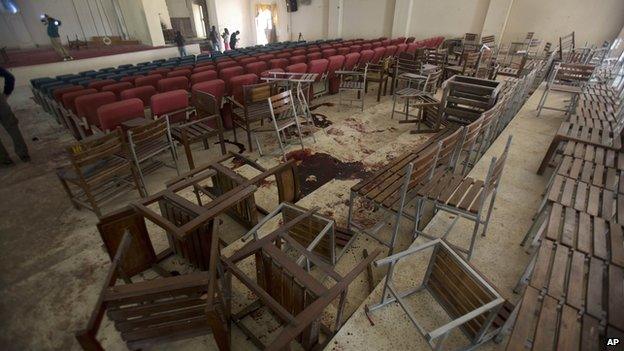Peshawar school massacre survivors recall horror of attack
- Published

Explosions and gunfire led to 141 deaths and left a trail of destruction in the army-run school.
The first two gun shots that rang out in Peshawar's Army Public School on Tuesday morning did not raise much alarm.
Students who survived the Pakistan Taliban's deadliest attack say it sounded unusual but their teachers said not to bother, that it might be the army doing training.
The army personnel who later stormed the premises believe those gun shots killed a guard who was probably sitting on top of stairs that ascend from the driveway to the main hall of the school - the auditorium - where much of the carnage took place.
"Then there were three or four more shots in quick succession, and I realised we were under attack," says Sitwat Jafri, 17, a 12th grade student.
Sitwat was one of about 45 students who were having exams in the first-floor hall of the school wing. The windows of the hall face the driveway, and the north-western compound wall beyond it, that separates the school from a strip of farmland and is topped with barbed wire.
The BBC was one of the first broadcasters to see inside the school
'Men running'
The students' initial fears that they were under attack by militants were well founded.
Sitwat says four or five months ago a bomb was discovered on one of the school lawns and everyone was evacuated through the back gate - to the south.
Officials say there was also a major security alert in August last year, which led to demands by teachers that the northern and western walls of the compound be fortified.

Areas to the west and north-west of the school constitute Peshawar's "dangerous" rural backyard of Tehkal village, and include an Afghan refugee camp called Ghundai.
"The area is infested with criminals, and Afghan refugee camps have traditionally provided hideouts for militants out on a mission," a senior police official told the BBC.
However, the local army authorities that run the school took no action at the time.
They now admit the militants cut the barbed wire to scale the wall from this very side.
And this is also what one of the boys in the exam hall saw.
"A friend of mine who was sitting close to the window said he saw some men running from the side of the compound wall and then split up - heading towards different blocks," Sitwat says.
Some bullets hit the windows and broke the glass. Teachers on duty in the hall told the boys to move to the centre of the hall and lie down so that they were not visible from any side.
'A slight burning sensation'
Sitwat says they were rescued by the army an hour or so later.

Baqir Jafri's mother, seen in the photograph, was a teacher at the school.
His younger brother, 15-year-old Baqir Jafri, was not so lucky. He was hit in the head, but the bullet just grazed his skin and did not pierce the bone.
Baqir was in the auditorium.
An army medical team had just started a workshop for students on first aid. Scores of boys between the ages of 14 and 16 were present in the hall when they heard the first two shots.
"Then we heard a third shot, and our principal, Madam Tahira Qazi, who was sitting in the front row, turned around and asked one of the teachers to lock the back door. I turned around to see Sir Javed walk up to the door, but before he could lock it, he was hit by two bullets that came through the glass. He fell down."
Baqir saw two gunmen push through the door and start shooting. He ducked under his seat.
The gunmen were walking down the aisles from behind, shooting the boys randomly. Most were killed.
One gunman who walked past Baqir's seat didn't see him, but then he stopped, and turned around, and saw his head.
"When he shot at me, I pushed back my head slightly. The bullet rubbed past my forehead. There was a slight burning sensation, but no real pain. But later when I touched my head, it was bleeding. The gunman probably took me for dead and walked on down the aisle, shooting boys and teachers. I saw him shoot our teacher Ms Hafsa three times in the back of the head.
He says the hall had been filled with smoke. The gunmen went through the left exit in front of the hall, towards the college wing.
The boys who were still alive scampered towards the two exit doors on either side of the hall. Baqir ran to the stage and ducked into the small dressing suite on the right which had another exit towards the administration wing in front of the hall.
He could hear bursts of assault rifle fire from the college wing as well as the administration wing.

The school buildings were left riddled with bullet holes
In that suite he was shot at again, by a gunman who came chasing the boys who were trying to escape.
The bullet went past him and hit another boy in the arm. There were some more shots fired and the huge mirror on the dressing room wall came down in pieces.
He pretended he was dead, lying amid glass shards, several dead boys and some who were still alive. In the second chamber of the suite a teacher's body was on fire. She appeared to be dead.
He lay there for "an hour or two hours" listening to heavy gunfire and explosions, mostly from to one side of the administration wing. Then he heard someone calling, "anybody there?".
He saw an army man. He lifted his head. The soldier told him to raise his hands and come out.
'No news of Mama'
While he was taken to hospital in an ambulance, his elder brother, Sitwat, who had escaped was worried about his mother, Farhat Jafri, also a teacher in the school.
"Mama was on duty in our examination hall, but she had a sore throat and a slight fever, so another duty teacher advised her to go and rest in the staff room, which is adjacent to the auditorium. Mama left half an hour before the firing started."

The school auditorium was the site of much bloodshed - students were studying first aid at the time
Sitwat never saw his mother alive again.
"I waited at the gate. I was asking every student that was coming out if he had seen her. But nobody said yes. I rang her number a hundred times but there was no response. I rang my father who said my brother was safe in the hospital but there was no news of Mama.
"Then one of the boys told me he saw her running from the staff room to the auditorium when the firing broke out," Sitwat breaks into sobs.
"I knew then that she was running for my brother, who was in the auditorium. And that's where she fell, because her handbag and mobile phone were found near the auditorium's stairs."